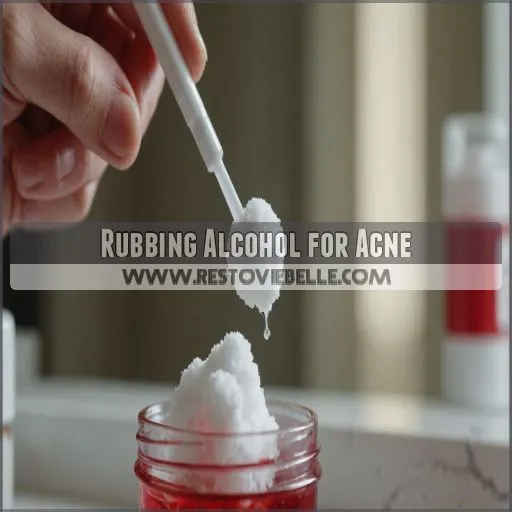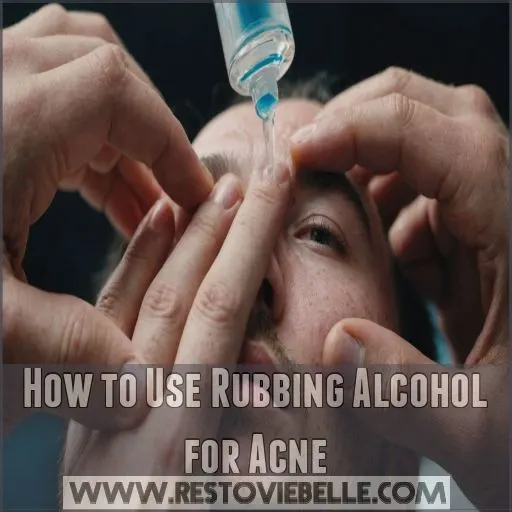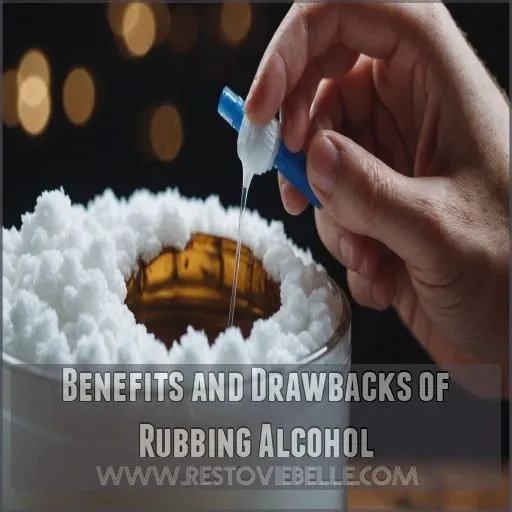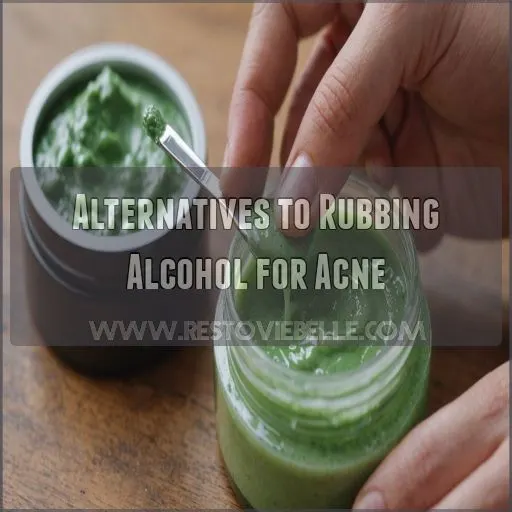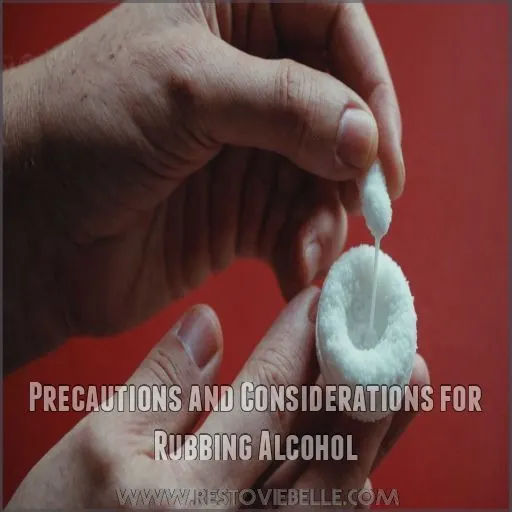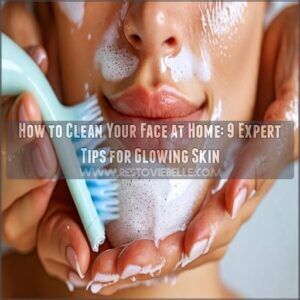This site is supported by our readers. We may earn a commission, at no cost to you, if you purchase through links.
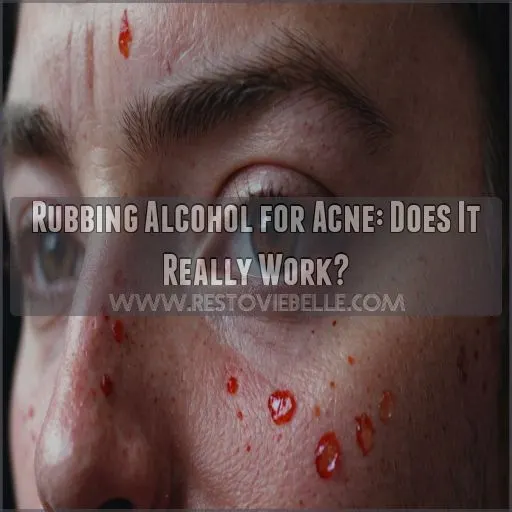 Does rubbing alcohol get rid of acne? Well, it’s a bit of a double-edged sword. It can zap acne-causing bacteria and dry out those pesky pimples.
Does rubbing alcohol get rid of acne? Well, it’s a bit of a double-edged sword. It can zap acne-causing bacteria and dry out those pesky pimples.
But—and it’s a big but—it could also dry your skin like a deserted desert. This could lead to even more oil production and oops, more breakouts.
Dermatologists usually suggest skipping it, favoring gentler treatments like benzoyl peroxide or salicylic acid. Consider your skin’s feelings; nobody likes being red and irritated. Want to know the best way to care for your skin without an alcohol hangover? Stick around; we’ve got the scoop for you.
Table Of Contents
- Key Takeaways
- Rubbing Alcohol for Acne
- How to Use Rubbing Alcohol for Acne
- Benefits and Drawbacks of Rubbing Alcohol
- Alternatives to Rubbing Alcohol for Acne
- Precautions and Considerations for Rubbing Alcohol
- Frequently Asked Questions (FAQs)
- Does rubbing alcohol affect acne?
- How to get rid of acne fast?
- Does alcohol make acne better?
- What alcohol is best for acne?
- Can rubbing alcohol treat acne scars effectively?
- How does rubbing alcohol affect acne-prone areas?
- What is the impact on hormonal acne?
- Does rubbing alcohol interact with acne medications?
- Can rubbing alcohol prevent future acne outbreaks?
- Conclusion
Key Takeaways
- Using rubbing alcohol on acne is like trying to fix everything with duct tape—it might stick at first by drying out pimples, but it can also parch your skin, leading to even more oil and breakouts. Dermatologists usually give it a thumbs down in favor of gentler options.
- Imagine going to a party and realizing you’re not quite dressed for the occasion—that’s rubbing alcohol for blackheads and whiteheads. It misses the mark. Turns out, it dries out oil but can spur an oil rebellion, so your pores stay clogged.
- Team up with proven fighters like benzoyl peroxide and salicylic acid instead. These allies unclog pores and tackle bacteria without leaving your skin feeling like a desert. It’s like choosing a spa over a sandstorm.
- Before you dive headfirst into a pool of alcohol-based remedies, consider a patch test first. It’s your skin whispering, “Hey, caution’s the name of the game!” Consulting a dermatologist is always a good idea to avoid turning your face into a dried-up raisin.
Rubbing Alcohol for Acne
If you’ve ever tried to zap a zit with rubbing alcohol, you’re hoping its drying power will shrink those pesky pimples.
While it might help reduce inflammation, it’s not the perfect solution for all kinds of acne, and experts often recommend other options.
Effectiveness in Reducing Inflammation
Rubbing alcohol’s antimicrobial properties may help combat the P. acnes bacteria behind inflammatory acne.
By breaking down these pesky microbes, it can potentially shrink pimples and reduce redness.
Just be cautious – the drying effects could irritate sensitive skin, so start with a small patch test and follow up with moisturizer.
Limitations for Non-Inflammatory Acne
When tackling blackheads and whiteheads, rubbing alcohol may not be your knight in shining armor.
These sneaky villains sneak into your pores and set up camp.
Rubbing alcohol does dry out oil, but it may upset balance by boosting oil production.
So, if you’re battling clogged pores, it could be as effective as using a sieve for soup.
Comparison With Other Acne Treatments
Ever compared acne treatments? Here’s the skinny:
- Benzoyl Peroxide: Like a fire extinguisher, it fights bacteria fast.
- Salicylic Acid: Unclogs pores and is the spicy salsa of skincare—zesty and effective.
- Alternative Remedies: Fancy a natural route? These can be the yoga stretch to your acne woes.
Rubbing alcohol? It’s not the only player!
Expert Recommendations and Warnings
You’ve considered alternatives and made some comparisons—now, let’s hear from the experts.
Dermatologists often advise against rubbing alcohol due to skin sensitivity and potential long-term effects.
It’s like using a sledgehammer when a scalpel will do.
They recommend alcohol-free options, ensuring your skin stays calm and collected.
Always consult a dermatologist before leaping into any new acne treatment.
How to Use Rubbing Alcohol for Acne
If you’re considering using rubbing alcohol to tackle your acne, there’s a right way to go about it.
First, make sure to properly prepare your skin and dilute the alcohol before application to minimize irritation.
Preparing the Skin for Application
Before you rush to rub that alcohol on your face, make sure your skin’s ready.
Start by cleansing with a gentle wash.
Exfoliating (but not with a sandpaper!), can help remove dead skin cells.
Follow up with toning and moisturizing to maintain balance.
Finally, patch testing is your trusty sidekick for safety.
Voilà, skin prepped!
Diluting Rubbing Alcohol With Carrier Oils
Now that your skin’s ready, how about adding a little twist to the mix?
Diluting rubbing alcohol with carrier oils like olive or tea tree oil can add some serious pizzazz to your acne treatment routine.
This gentle concoction may help soothe while still packing a punch against pimples.
Patch Testing for Sensitivity
Testing before you leap can save your skin from surprises! Make sure rubbing alcohol won’t wreak havoc by patch testing:
- Apply a small amount on your arm.
- Watch for reactions like redness or itchiness.
- Check after 24 hours.
Your skin type might react differently, so finding the right alcohol concentration is key. Consider alternatives if things get spicy!
Applying Rubbing Alcohol to Affected Areas
Once you’ve prepped your skin, it’s time to apply the rubbing alcohol.
Gently dab a small amount onto a cotton ball or swab, then lightly dot it onto the affected areas.
Go easy – a little goes a long way!
Avoid rubbing or scrubbing, as that can further irritate your skin.
Following Up With Skincare Routine
After applying rubbing alcohol, your skin might feel like a desert in summer.
Don’t fret! Following up with a proper skincare routine helps maintain balance:
- Moisturizing: Quench that thirsty skin with a creamy drink.
- Toners: Refresh and prep your face.
- Hydrating serums: Lock in moisture like you’re securing Fort Knox.
- Sunscreen: Protect from UV battles.
Benefits and Drawbacks of Rubbing Alcohol
Using rubbing alcohol for acne can dry out pimples quickly, but it’s not all smooth sailing.
You’ll want to tread lightly, as overuse can lead to skin irritation and even make your skin oilier.
Drying Out Pimples and Reducing Inflammation
Rubbing alcohol might work wonders for drying out pesky pimples, effectively reducing inflammation like a superhero, but it’s not all sunshine and rainbows.
While it’s tempting to reach for this quick fix, weighing inflammation vs. dryness is important.
For those with sensitive skin, balancing alcohol’s effectiveness with potential irritation makes it a tightrope walk worth considering carefully.
Potential Risks of Dryness and Irritation
While rubbing alcohol may help dry out pimples, it can also leave your skin feeling parched and irritated.
Tread carefully – this potent potion can cause redness, flaking, and even worsen breakouts if overused.
Be sure to patch test and moisturize after application to prevent your complexion from becoming a desert.
Impact on Sebaceous Glands and Oil Production
In considering rubbing alcohol for acne, think of your sebaceous glands as overzealous oil producers.
When you dry the skin too much, these glands kick into high gear, often worsening acne triggers!
Balancing the Skin Barrier’s Impact can help control the Oil Production Cycle, ensuring your face doesn’t become a greasy mess.
It’s all about moderation!
Long-Term Consequences of Overuse
Overusing rubbing alcohol on your skin is like inviting an unending itch party—only without the fun.
Over time, you might face skin barrier damage and increased sensitivity.
This can lead to scarring potential and long-term irritation, making you more prone to acne flare-ups.
So, before you use alcohol-based solutions, remember: moderation keeps the skin drama-free.
Balancing Benefits and Risks
So, you’re thinking about using rubbing alcohol for acne and wondering if it’s a good idea. Here are some things to consider:
- Skin Sensitivity: It may cause irritation.
- Long-Term Effects: Overuse isn’t wise.
- Individual Needs: What works for some may not work for you.
- Alternative Solutions: Try benzoyl peroxide or salicylic acid.
- Expert Opinions: Dermatologists often suggest gentler options.
Alternatives to Rubbing Alcohol for Acne
If rubbing alcohol isn’t your cup of tea, don’t worry – there are plenty of other effective acne treatments out there like natural ingredients.
From tried-and-true ingredients like benzoyl peroxide and salicylic acid to personalized prescriptions and natural remedies, you’ve got options galore to tackle those pesky breakouts.
Benzoyl Peroxide and Salicylic Acid
Benzoyl peroxide and salicylic acid are real game-changers for acne treatment.
These alternatives to rubbing alcohol are known for their effectiveness in reducing breakouts.
While benzoyl peroxide targets bacteria, salicylic acid dives into pores, exfoliating from within.
So, instead of leaving your skin drier than a desert, these allies work like a charm without those pesky side effects.
Prescription Medications and Procedures
Let’s explore prescription medications for acne. They’re like the superheroes of the skincare world!
Consider these options:
- Oral antibiotics target acne-causing bacteria.
- Topical treatments fight breakouts directly on the skin.
- Laser therapy zaps acne scars.
- Hormonal therapy offers balance for stubborn cases.
Natural Remedies and Gentle Skincare
Natural remedies for acne can be as simple as a friendly chat with Mother Nature, like exploring vitamin and supplement options. Consider using aloe vera for its soothing touch or tea tree oil for its effective punch against acne-causing bacteria.
Check the table for options:
| Remedy | Benefit |
|---|---|
| DIY Masks | Deep cleansing |
| Tea Tree Oil | Antimicrobial |
| Aloe Vera | Soothing |
| Essential Oils | Targeted action |
| Gentle Cleansers | Minimize irritation |
These gentle options might keep irritation at bay while giving you some control over your skincare.
Combining Treatments for Optimal Results
For best results, consider combining rubbing alcohol with other proven acne-fighting ingredients like benzoyl peroxide or salicylic acid.
This synergistic approach can help tackle different aspects of acne, from reducing inflammation to unclogging pores.
Just be sure to start slowly and monitor your skin’s reaction to avoid over-drying or irritation.
- Benzoyl peroxide
- Salicylic acid
- Topical retinoids
Consulting a Dermatologist for Personalized Advice
Finding the right acne treatment can feel like juggling hot potatoes—so many options, yet so unpredictable. Teaming up with a dermatologist provides personalized advice based on your acne severity and skin type. They’ll guide you through treatment options and medications, ensuring you’re not sidelined by side effects. Trust them—you’ll get guidance and peace of mind all wrapped up.
Acne concerns can trigger a range of emotions.
| Concerns | Emotions | Solutions |
|---|---|---|
| Scarring | Fear | Professional Help |
| Redness | Frustration | Proper Routine |
| Breakouts | Anxiety | Effective Treatment |
| Dryness | Irritation | Expert Advice |
| Overuse | Regret | Balanced Approach |
Precautions and Considerations for Rubbing Alcohol
Using rubbing alcohol on your skin might make you feel like a mad scientist, but it’s important to be careful and start with small amounts to avoid turning your face into a desert.
Remember to moisturize afterward and keep an eye out for any unwanted side effects, adjusting your approach as needed, and don’t hesitate to ask a dermatologist for advice.
Patch Testing and Starting With Small Amounts
You’re about to try acne treatment with rubbing alcohol, but let’s not jump in before we check things out, okay? Patch-test first to dodge any skin drama.
Here’s how:
- Dab a small amount on your arm.
- Wait 24 hours for reactions.
- Spot check the face.
- Gradually increase if all’s clear.
Just a touch first, then proceed!
Moisturizing to Prevent Dryness and Irritation
Moisturizing is key to preventing the dryness and irritation that can come with using rubbing alcohol on your skin.
Try pairing it with a gentle, oil-free moisturizer to keep your complexion hydrated and happy.
Here’s a handy table to help you find the right moisturizer for your skin type:
| Skin Type | Recommended Moisturizer |
|---|---|
| Dry | Creamy, emollient formula |
| Oily | Lightweight, oil-free gel |
| Sensitive | Fragrance-free, soothing formula |
| Combination | Gel-cream hybrid |
| Acne-prone | Non-comedogenic, oil-free |
Moisturizing after using rubbing alcohol can make all the difference in maintaining a healthy, balanced complexion.
Avoiding Overuse and Long-Term Consequences
Using rubbing alcohol for acne can be like playing with fire—you might end up burning your own skin!
While it seems like a miracle cure, overuse can lead to skin irritation and damage the skin barrier.
To avoid long-term effects, consider:
- Alcohol dependence isn’t ideal; use sparingly.
- Alternative options offer gentler solutions.
- Moderation and awareness keep your skin healthy.
Monitoring for Side Effects and Adjusting Treatment
Spotting side effects is important.
If itchiness or peeling isn’t playing nice with your skin, adjust your routine.
Try spacing out treatments or pairing with a gentle cleanser.
Here’s a handy table to help you:
| Reaction | What to Do |
|---|---|
| Redness | Reduce Frequency |
| Dryness | Add Moisturizer |
| Itching | Use Soothing Cream |
| Peeling | Apply Less Alcohol |
| Burning | Stop Use Immediately |
Stay tuned to your skin’s signals!
Consulting a Dermatologist for Guidance
If after monitoring for side effects you still feel like a lost explorer in the jungle of acne treatments, consulting a dermatologist can shine a light on the best path forward.
They provide professional advice, offering personalized skincare and acne treatment options for oily skin and blackheads.
For severe acne cases, a dermatologist consultation gives you the peace of mind that you’re on the right track.
Frequently Asked Questions (FAQs)
Does rubbing alcohol affect acne?
Rubbing alcohol might tackle acne like a strict coach, but it can also irritate your skin.
It’s no magic bullet and may worsen breakouts.
Chat with a dermatologist about effective and safe acne solutions for a personalized approach.
How to get rid of acne fast?
You can get rid of acne fast by using proven treatments like benzoyl peroxide or salicylic acid.
Steer clear of harsh DIY remedies like rubbing alcohol, which can actually worsen breakouts.
Consult a dermatologist for personalized advice.
Does alcohol make acne better?
Alcohol can zap those pesky pimples into submission, but it might dry your skin like an old leaf.
It’s a gamble; some find it helpful, while others see redness and irritation.
Testing first is essential!
What alcohol is best for acne?
Did you know 80% of teens experience acne?
For clearer skin, steer clear of isopropyl alcohol; it’s like pouring fuel on the fire!
Instead, choose alcohol-free treatments like salicylic acid, gentler and more effective.
Can rubbing alcohol treat acne scars effectively?
Rubbing alcohol on acne scars is like trying to fix a cracked window with a band-aid—it doesn’t quite cut it.
Instead, explore treatments such as retinoids or chemical peels for more effective scar reduction.
How does rubbing alcohol affect acne-prone areas?
Rubbing alcohol can be a double-edged sword for acne-prone skin.
It may temporarily dry out blemishes, but it can also strip your skin, triggering excess oil production and worsening breakouts.
Tread carefully and consult a dermatologist for personalized guidance.
What is the impact on hormonal acne?
You might find using rubbing alcohol on hormonal acne a bit like bringing a water gun to a forest fire.
It can dry out skin but often worsens the situation by triggering more oil production, leading to breakouts.
Does rubbing alcohol interact with acne medications?
Mixing rubbing alcohol with acne meds can cause over-drying or irritation, like too much sun without sunscreen.
Talk to a dermatologist before use to make sure your skin doesn’t feel like a desert—and not in a good way.
Can rubbing alcohol prevent future acne outbreaks?
Regarding future acne outbreaks, don’t count your chickens before they hatch.
Rubbing alcohol’s effectiveness shortens against preventing outbreaks.
Its drying effects might backfire, making skin produce more oil—creating a vicious cycle of breakouts.
Conclusion
Ponder the perils of pouring on the rubbing alcohol – it may zap zits, but could also zap your skin’s moisture, sparking a slippery slope of sebum surges and stubborn breakouts.
Instead, opt for acne-fighting allies like benzoyl peroxide or salicylic acid, and consult a dermatologist to devise a delicate, customized skincare routine that keeps your complexion calm and clear.
In terms of using rubbing alcohol to get rid of acne, moderation is key.

